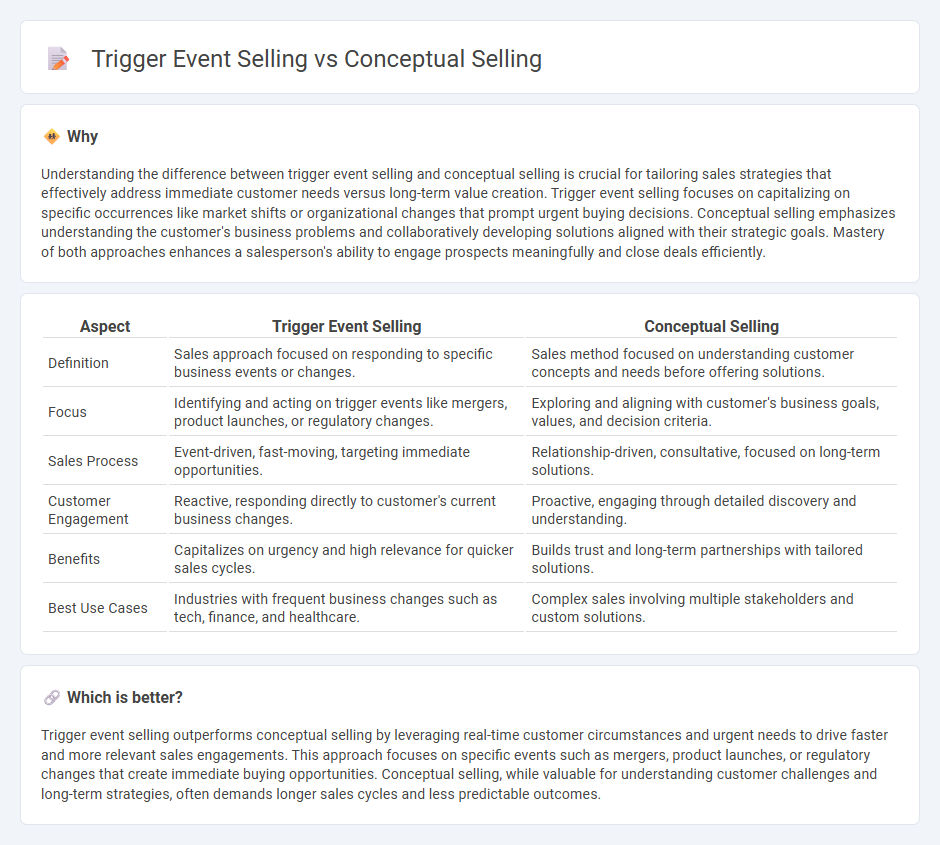
Trigger event selling focuses on leveraging specific occurrences, such as mergers or new regulations, that prompt immediate customer needs, enabling sales teams to offer timely solutions. Conceptual selling centers on understanding the buyer's broader challenges and decision-making criteria to tailor value-driven proposals. Explore the key differences and strategies to enhance your sales effectiveness.
Why it is important
Understanding the difference between trigger event selling and conceptual selling is crucial for tailoring sales strategies that effectively address immediate customer needs versus long-term value creation. Trigger event selling focuses on capitalizing on specific occurrences like market shifts or organizational changes that prompt urgent buying decisions. Conceptual selling emphasizes understanding the customer's business problems and collaboratively developing solutions aligned with their strategic goals. Mastery of both approaches enhances a salesperson's ability to engage prospects meaningfully and close deals efficiently.
Comparison Table
| Aspect | Trigger Event Selling | Conceptual Selling |
|---|---|---|
| Definition | Sales approach focused on responding to specific business events or changes. | Sales method focused on understanding customer concepts and needs before offering solutions. |
| Focus | Identifying and acting on trigger events like mergers, product launches, or regulatory changes. | Exploring and aligning with customer's business goals, values, and decision criteria. |
| Sales Process | Event-driven, fast-moving, targeting immediate opportunities. | Relationship-driven, consultative, focused on long-term solutions. |
| Customer Engagement | Reactive, responding directly to customer's current business changes. | Proactive, engaging through detailed discovery and understanding. |
| Benefits | Capitalizes on urgency and high relevance for quicker sales cycles. | Builds trust and long-term partnerships with tailored solutions. |
| Best Use Cases | Industries with frequent business changes such as tech, finance, and healthcare. | Complex sales involving multiple stakeholders and custom solutions. |
Which is better?
Trigger event selling outperforms conceptual selling by leveraging real-time customer circumstances and urgent needs to drive faster and more relevant sales engagements. This approach focuses on specific events such as mergers, product launches, or regulatory changes that create immediate buying opportunities. Conceptual selling, while valuable for understanding customer challenges and long-term strategies, often demands longer sales cycles and less predictable outcomes.
Connection
Trigger event selling leverages specific occurrences such as mergers, product launches, or regulatory changes to identify timely sales opportunities, closely aligning with conceptual selling's focus on understanding a buyer's needs and decision-making process. Both approaches emphasize tailoring sales strategies to the buyer's current context, ensuring relevance and increasing the likelihood of closing deals. Integrating trigger event data into conceptual selling frameworks enhances the salesperson's ability to position solutions effectively against evolving customer scenarios.
Key Terms
Customer Perspective (Conceptual Selling)
Conceptual Selling centers on understanding the customer's needs, motivations, and decision-making process to align solutions with their specific challenges and goals. This approach emphasizes deep customer insight, allowing sales professionals to tailor their message based on the buyer's perspective rather than just the product features. Explore how mastering the Customer Perspective in Conceptual Selling can transform your sales strategy.
Buying Signals (Trigger Event Selling)
Trigger Event Selling emphasizes identifying and responding to specific buying signals triggered by significant events like mergers, leadership changes, or regulatory shifts, which indicate a heightened urgency to purchase. This approach contrasts with Conceptual Selling by prioritizing real-time business changes over understanding overall buyer motivations. Discover how focusing on these pivotal buying signals can accelerate your sales process and improve closing rates.
Solution Fit (Conceptual Selling)
Conceptual Selling emphasizes identifying a solution fit by deeply understanding customer needs, aligning product benefits with those specific pain points to ensure long-term value and partnership. This approach contrasts with Trigger Event Selling, which targets immediate opportunities based on external events prompting buyer action, often prioritizing timing over tailored solutions. Explore how integrating Solution Fit into your sales strategy can drive more meaningful customer engagements and sustainable success.
Source and External Links
What is Conceptual Selling? - Conceptual selling is a methodology where customers buy the concept of a solution, not just the solution itself, emphasizing understanding buyer motivations and building long-term relationships, especially effective for complex B2B deals with multiple decision-makers.
What is Conceptual Selling? (Explained With Examples) - This sales method focuses on selling the concept behind a product rather than the product itself by aligning with buyers' desires and needs to close complex deals, making the product a 'MacGuffin' that symbolizes a valuable concept.
A Quick Guide to Concept Selling (Updated 2024) - Concept selling highlights that customers are motivated to buy by the impact a solution will have on their lives, requiring research, questioning, listening, and personalization to realize their unique reasons for purchase.
 dowidth.com
dowidth.com